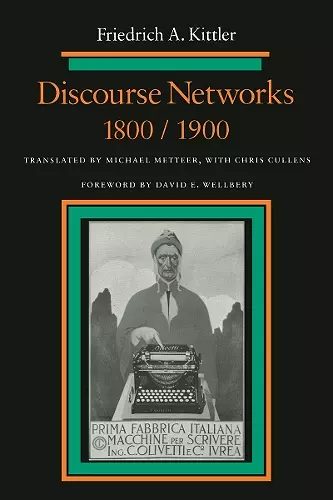Discourse Networks, 1800/1900
Format:Paperback
Publisher:Stanford University Press
Published:1st Jul '92
Should be back in stock very soon

This is a highly original book about the connections between historical moment, social structure, technology, communications systems, and what is said and thought using these systems - notably literature. The author focuses on the differences between "discourse networks" in 1800 and 1900, in the process developing a new analysis of the shift from romanticism to modernism. The work might be classified as a German equivalent to the New Historicism of American literary scholars, both in the intellectual influences to which Kittler responds and in his concern to ground literature in the most concrete details of historical reality.
The artful structure of the book begins with Goethe's Faust and ends with Valery's Faust. In the 1800 section, the author discusses how language was learned, the emergence of the modern university, the associated beginning of the interpretation of contemporary literature, and the canonization of literature. Among the writers and works Kittler analyzes in addition to Geothe's Faust are Schlegel, E.T.A. Hoffmann's "The Golden Pot," and Goethe's Tasso.
The 1900 section argues that the new discourse network in which literature is situated in the modern period is characterized by new technological media - film, the photograph, and the typewritten page - and the crisis that these caused for literary production. Along the way, the author discusses the work of Nietzsche, Getrude Stein, Mallarme, Bram Stoker, the Surrealists, Rilke, Kafka, and Freud, among others.
“A new and encyclopedic vision of modern German literary, intellectual and social history, achieved through the optic of discourse analysis, psychoanalysis, and semiotic theory, analyzed in a spirit of playfulness and impudent precision.”—Stanley Corngold, Princeton University
"Kittler is the true heir to McLuhan's legacy. Where the latter relied on prophecy and striking formulas, Kittler provides thorough yet insightful analysis, drawing upon all the reurces of a well-informed theoretical imagination. In this book, he retraces the contours of one of modernity's foundational configurations: that if the inscription systems that determine the positions of subjects in relation to the materialities of the means of communication and to the changing patterns of human conviviality that are derived from them. The book proves compelling not only because of the power of its analyses but also because it provides a model or rigor for this type of endeavor in cticital studies."—Wlad Godzich, University of Montreal
ISBN: 9780804720991
Dimensions: unknown
Weight: 667g
496 pages